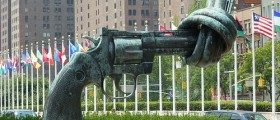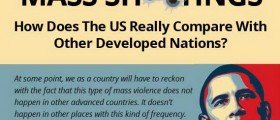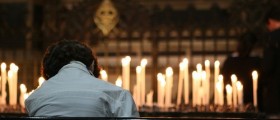A film by Fernando Meirelles and Katia Lund
Roger Ebert has heaped praise upon praise for City of God and all of it is warranted. The City of God slums are an offshoot of Rio de Janeiro that were created to keep the poor and the homeless away from the tourist centers of Rio. The result was a slum that is brimming with violence and pain. One can almost feel the hopelessness just bubbling up in the City of God, and that is not an exaggeration. The film is narrated by, and ultimately focuses on a young man named Rocket (Alexandre Rodrigues). Rocket reveals the lore of City of God, what the slum is and how it became so. Rocket tells us the story, moving backwards and forwards in time to tell the story in the way it should be told. He tells us of an event, but rather than going into detail about that event, Rocket will then show us what we need to know to understand that event in context. He will introduce a character, but then say but now is not the time to tell his story. Rocket is a master storyteller and the entire film is his canvas, revealing bits and pieces at the perfect time.
To tell the story of the City of God slums, we have to be told the story of L il Ze (Leandro Firmino). L il Ze began as a child wanting to run with one of the local gangs, but in time he grew up and was strong enough (and quick enough) to start eliminating and taking over rival gangs until L il Ze had to be acknowledged the true king of the City of God. With the advise of his only true friend Benny (Phellipe Haagensen), L il Ze did permit one gang to survive, that of Carrot (Matheus Nachtergaele), and it is the uneasy peace between these two gangs that provides much of the tension inside the City of God. This is rough, violent, and poor slum with desperate men and all that is needed is just one tiny spark to start another turf war.
City of God is powerful, stunning, violent, beautiful, stark, and it is one of the best films of the past decade. The acting is raw, and rough and it feels authentic. While we do not see the day to day life of the slum, we see the greater danger where there is always a risk of a raid or a shootout and just by trying to live their lives; people can be dragged into a war. City of God is not violent for the sake of being violent, nor is it gratuitous. I would say that the violence is portrayed in a realistic manner and reflects the reality of the actual City of God slum. The violence, while important to the film does not overpower the story being told and it is not overly graphic. Directors Fernando Meirelles and Katia Lund do not give any easy answers but only reveal a way of life that is alien to everything I know. Being born into the City of God, a child grows up into something that he cannot control and can only hope to survive in by any means that he can. City of God shows how Rocket survives, and also gives a glimpse of what happens if someone like L il Ze takes another path. City of God is a foreign language film and while it is similar in some respects to American gangster films like Goodfellas , this movie goes in a different direction. It must be said that it is just as good, though.
Roger Ebert has heaped praise upon praise for City of God and all of it is warranted. The City of God slums are an offshoot of Rio de Janeiro that were created to keep the poor and the homeless away from the tourist centers of Rio. The result was a slum that is brimming with violence and pain. One can almost feel the hopelessness just bubbling up in the City of God, and that is not an exaggeration. The film is narrated by, and ultimately focuses on a young man named Rocket (Alexandre Rodrigues). Rocket reveals the lore of City of God, what the slum is and how it became so. Rocket tells us the story, moving backwards and forwards in time to tell the story in the way it should be told. He tells us of an event, but rather than going into detail about that event, Rocket will then show us what we need to know to understand that event in context. He will introduce a character, but then say but now is not the time to tell his story. Rocket is a master storyteller and the entire film is his canvas, revealing bits and pieces at the perfect time.
To tell the story of the City of God slums, we have to be told the story of L il Ze (Leandro Firmino). L il Ze began as a child wanting to run with one of the local gangs, but in time he grew up and was strong enough (and quick enough) to start eliminating and taking over rival gangs until L il Ze had to be acknowledged the true king of the City of God. With the advise of his only true friend Benny (Phellipe Haagensen), L il Ze did permit one gang to survive, that of Carrot (Matheus Nachtergaele), and it is the uneasy peace between these two gangs that provides much of the tension inside the City of God. This is rough, violent, and poor slum with desperate men and all that is needed is just one tiny spark to start another turf war.
City of God is powerful, stunning, violent, beautiful, stark, and it is one of the best films of the past decade. The acting is raw, and rough and it feels authentic. While we do not see the day to day life of the slum, we see the greater danger where there is always a risk of a raid or a shootout and just by trying to live their lives; people can be dragged into a war. City of God is not violent for the sake of being violent, nor is it gratuitous. I would say that the violence is portrayed in a realistic manner and reflects the reality of the actual City of God slum. The violence, while important to the film does not overpower the story being told and it is not overly graphic. Directors Fernando Meirelles and Katia Lund do not give any easy answers but only reveal a way of life that is alien to everything I know. Being born into the City of God, a child grows up into something that he cannot control and can only hope to survive in by any means that he can. City of God shows how Rocket survives, and also gives a glimpse of what happens if someone like L il Ze takes another path. City of God is a foreign language film and while it is similar in some respects to American gangster films like Goodfellas , this movie goes in a different direction. It must be said that it is just as good, though.
Loading...
















